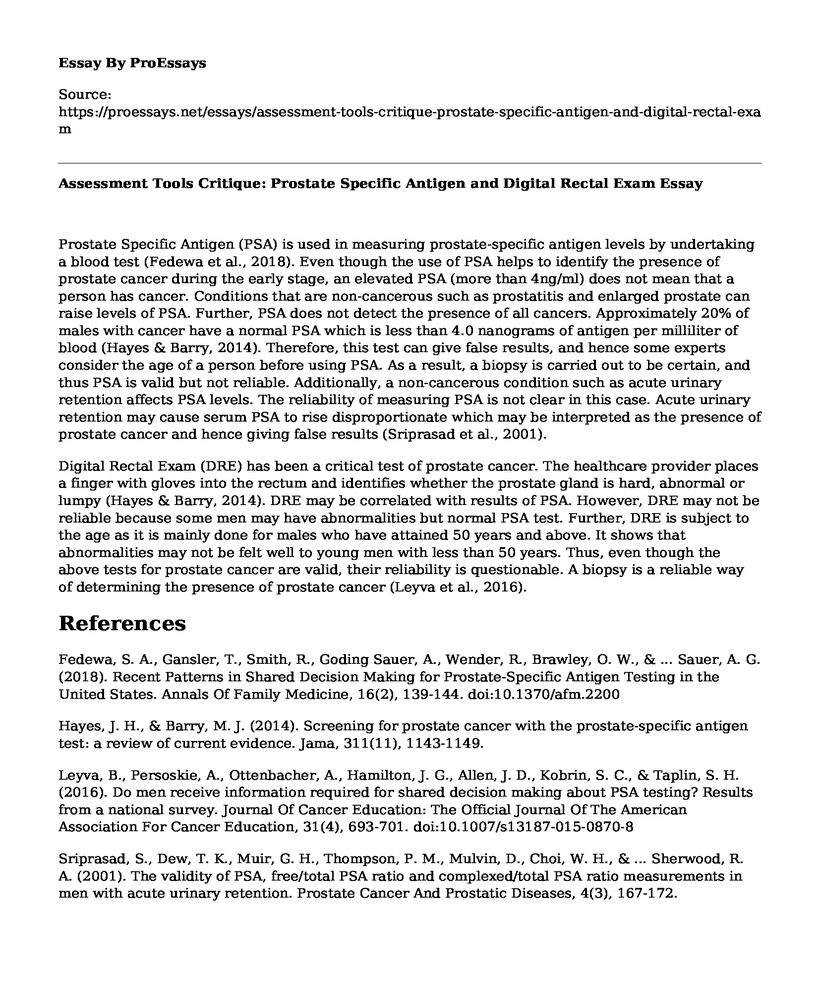Prostate Specific Antigen (PSA) is used in measuring prostate-specific antigen levels by undertaking a blood test (Fedewa et al., 2018). Even though the use of PSA helps to identify the presence of prostate cancer during the early stage, an elevated PSA (more than 4ng/ml) does not mean that a person has cancer. Conditions that are non-cancerous such as prostatitis and enlarged prostate can raise levels of PSA. Further, PSA does not detect the presence of all cancers. Approximately 20% of males with cancer have a normal PSA which is less than 4.0 nanograms of antigen per milliliter of blood (Hayes & Barry, 2014). Therefore, this test can give false results, and hence some experts consider the age of a person before using PSA. As a result, a biopsy is carried out to be certain, and thus PSA is valid but not reliable. Additionally, a non-cancerous condition such as acute urinary retention affects PSA levels. The reliability of measuring PSA is not clear in this case. Acute urinary retention may cause serum PSA to rise disproportionate which may be interpreted as the presence of prostate cancer and hence giving false results (Sriprasad et al., 2001).
Digital Rectal Exam (DRE) has been a critical test of prostate cancer. The healthcare provider places a finger with gloves into the rectum and identifies whether the prostate gland is hard, abnormal or lumpy (Hayes & Barry, 2014). DRE may be correlated with results of PSA. However, DRE may not be reliable because some men may have abnormalities but normal PSA test. Further, DRE is subject to the age as it is mainly done for males who have attained 50 years and above. It shows that abnormalities may not be felt well to young men with less than 50 years. Thus, even though the above tests for prostate cancer are valid, their reliability is questionable. A biopsy is a reliable way of determining the presence of prostate cancer (Leyva et al., 2016).
References
Fedewa, S. A., Gansler, T., Smith, R., Goding Sauer, A., Wender, R., Brawley, O. W., & ... Sauer, A. G. (2018). Recent Patterns in Shared Decision Making for Prostate-Specific Antigen Testing in the United States. Annals Of Family Medicine, 16(2), 139-144. doi:10.1370/afm.2200
Hayes, J. H., & Barry, M. J. (2014). Screening for prostate cancer with the prostate-specific antigen test: a review of current evidence. Jama, 311(11), 1143-1149.
Leyva, B., Persoskie, A., Ottenbacher, A., Hamilton, J. G., Allen, J. D., Kobrin, S. C., & Taplin, S. H. (2016). Do men receive information required for shared decision making about PSA testing? Results from a national survey. Journal Of Cancer Education: The Official Journal Of The American Association For Cancer Education, 31(4), 693-701. doi:10.1007/s13187-015-0870-8
Sriprasad, S., Dew, T. K., Muir, G. H., Thompson, P. M., Mulvin, D., Choi, W. H., & ... Sherwood, R. A. (2001). The validity of PSA, free/total PSA ratio and complexed/total PSA ratio measurements in men with acute urinary retention. Prostate Cancer And Prostatic Diseases, 4(3), 167-172.
Cite this page
Assessment Tools Critique: Prostate Specific Antigen and Digital Rectal Exam. (2022, Jul 13). Retrieved from https://proessays.net/essays/assessment-tools-critique-prostate-specific-antigen-and-digital-rectal-exam
If you are the original author of this essay and no longer wish to have it published on the ProEssays website, please click below to request its removal:
- Poverty is Capability of Deprivation
- Patient Tracer Discussion for Nightingale Community Hospital
- Essay Sample on Passive Smoking
- Insider Threats in Cyber Security Essay Example
- Health Freedom Act and Naturopathy Essay Example
- Essay on HFACS Application in Ameristar Air Cargo Runaway Overrun Accident
- Basic Characteristics of Qualitative Research - Essay Sample







